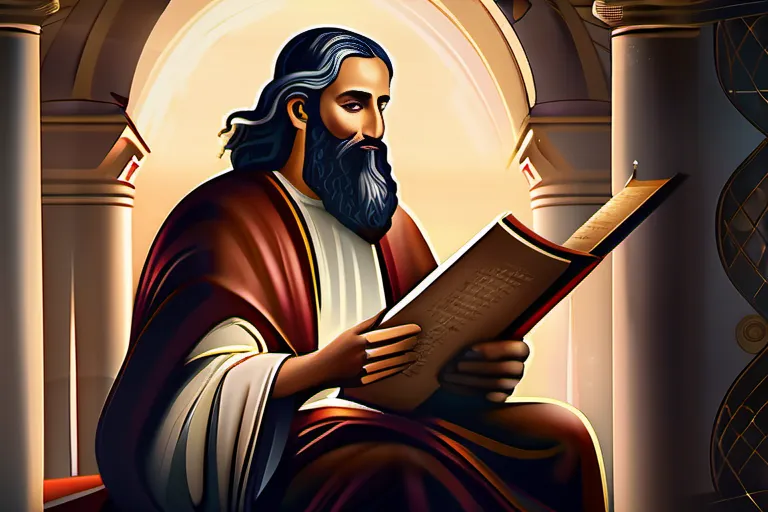Explore the life, teachings, and impact of one of Christianity’s most influential figures.
Delve into the fascinating story of Saint Paul, a key figure in the early Christian church. From his conversion to Christianity to his missionary journeys, we will explore the life and teachings of this influential apostle.
Early Life of Saint Paul
Who was Saint Paul? He is often referred to as the ‘Apostle of Christ’ for good reason, his life and teachings have shaped Christianity in profound ways. But where did it all begin?
Saul, the future Paul, was born into a world torn between Jewish traditions and Roman rule. Raised in Tarsus, a city of great learning and culture, Saul received an education that prepared him for a life in law or politics. His upbringing was steeped in the teachings of the Old Testament; he studied under the renowned rabbi Gamaliel, ensuring he was well-versed in the Law of Moses.
It’s hard to imagine a young Saul, with his future so promising and secure, caught up in the whirlwind of change that swept through Jerusalem. He became a zealous Pharisee, dedicating himself to eradicating those who threatened Jewish law. His passion was matched only by his conviction, until he had a life-changing encounter on the road to Damascus.
Imagine Saul, riding a horse under a sun so bright it blinded him momentarily. A voice speaks to him, ‘Saul, Saul, why are you persecuting me?’ It’s a rhetorical question that turns everything upside down. Who is Jesus speaking to? The one who was hunting down Christians or the future apostle of Christ?
The conversion of Saul into Paul was not just a change in name but a profound shift in identity. As he lay there, blinded by light and vision, his heart softened towards a God he once despised. This event, described in Acts 9:1-19, marks the beginning of an extraordinary journey.
From Saul, we see a man transformed – from persecutor to preacher, from outsider to insider. His change was so dramatic that it became his calling card. Paul’s conversion not only changed him but also opened up new possibilities for spreading the gospel beyond Jewish communities. The seeds he sowed in Damascus would grow into a global movement.
Saint Paul’s Missionary Journeys
Imagine you are walking through the bustling streets of ancient Rome, your heart pounding with a sense of urgency and purpose. You’re not just traveling; you’re on a mission to spread a new message, a message that has transformed your life and now shapes the world we live in today. This is what it felt like for Saint Paul as he embarked on his extensive journeys throughout the Mediterranean region.
From Antioch to Athens, from Ephesus to Corinth, each city became a battlefield where faith clashed with doubt. Paul’s approach was not just about preaching; it was about conquering. He didn’t just share the teachings of Christianity; he embodied them, living out his beliefs in ways that challenged and inspired those around him.
Consider the journey to Athens, a city known for its wisdom and philosophers. Paul didn’t hesitate to walk into the heart of this intellectual hub. In Acts 17:16-34, it’s written that he went straight to the Areopagus, addressing the Greeks with a message that was both profound and challenging. He spoke about the “unknown god” they worshiped, weaving together their own traditions with the teachings of Christ. It was as if he were planting seeds in fertile ground, waiting for them to take root.
Each stop on Paul’s journey had its unique challenges and triumphs. In Ephesus, he faced persecution but also saw his faith strengthen communities torn by idolatry. In Corinth, he dealt with personal trials yet built a church that would become the model for many Christian congregations. These cities became more than just destinations; they were battlefields where the future of Christianity was shaped.
Paul’s travels were not merely geographical; they were spiritual odysseys, filled with moments of doubt and triumph. He faced fierce opposition in Lystra and Derbe, yet his resilience inspired many. It’s these journeys that give us a window into his dedication and the profound impact he had on early Christian communities.
As we reflect on Saint Paul’s missionary journeys, it becomes clear that his travels were not just about spreading a message, but about transforming lives, communities, and ultimately, the course of history. Each step he took was part of a larger narrative, one that continues to resonate through time.
The Letters of Saint Paul
Imagine a set of letters, like ancient scrolls cradled in the hands of early Christians, each one carrying the weight of Paul’s words—words that would shape their faith and guide them through the challenges of their time. These letters, now known as the Epistles of Saint Paul, are not just texts but living testimonies to his influence on the burgeoning Christian community.
Consider how these epistles, written from various locations during Paul’s missionary journeys, offer a glimpse into the diverse landscapes of the early church. In Ephesians, for instance, Paul uses rich metaphors to paint a picture of the Christian life as a garden where all believers are grafted together as one body, each branch essential to the whole. Here, he encourages unity and love, much like nurturing young saplings into a flourishing tree.
In Galatians, Paul faces the challenge of defending his teachings against those who seek to add laws to the gospel. His argument is powerful and straightforward: if faith in Christ can save, then why should we burden others with legalistic requirements? This letter serves as a stark reminder that true salvation comes from grace alone, not works.
The letters also highlight Paul’s pastoral concerns for his churches. In Philippians, he expresses joy and gratitude even in the midst of his imprisonment, showing how trials can be transformed into opportunities for growth and thanksgiving. His words in this letter are a beacon of hope, urging believers to remain steadfast in their faith.
These epistles, then, are more than just religious texts; they are a narrative of Paul’s own spiritual journey, his struggles, victories, and the profound impact he had on shaping Christian doctrine. They serve as a living testament to his commitment to spreading Christ‘s message, reminding us that even in our darkest moments, we can find light through faith.
So, what role do these letters play in understanding Saint Paul’s legacy? They are the very fabric of early Christian history, weaving together a tapestry of doctrine and practice that continues to influence believers today.
Saint Paul’s Teachings
Who was Saint Paul? A figure whose teachings and letters have left an indelible mark on Christianity, Saint Paul’s insights continue to resonate across centuries. As we delve into his key teachings, let us ponder: What does it mean for a Christian to embrace faith in the context of grace?
In Saint Paul’s view, faith is not merely an intellectual assent but a living reality, a personal relationship with God that transforms one’s life. He often spoke of faith as a gift from God, something bestowed upon believers through His grace rather than achieved by human effort alone. Consider this: Can we truly claim to have a vibrant relationship with the divine if our faith is not grounded in the unmerited favor and love of Christ?
Paul’s teachings on grace are both profound and transformative. He preached that salvation comes through grace, emphasizing that it is by God’s grace alone that we are saved (Romans 3:24). This concept challenges the notion that human works or achievements can earn one’s way to heaven. Instead, it proposes a radical idea: that our standing before God is solely based on His mercy and not our own merit. How does this shift in perspective impact your understanding of divine love and forgiveness?
Moreover, Paul addressed the role of Christians in society with clarity and conviction. He believed that believers should be salt and light in the world (Matthew 5:13-16), a metaphor suggesting that Christians should positively influence their communities through ethical living and moral integrity. But what does this mean for our lives today? How can we, as followers of Christ, bring positive change to society?
Paul’s teachings on these subjects are not just historical curiosities but deeply relevant to contemporary Christian life. They challenge us to reevaluate our beliefs and actions, urging us to live out the grace and faith that form the core of our Christian identity.
The Impact of Saint Paul on Christianity
The impact of Saint Paul on Christianity is like a river that flows through time, nourishing and shaping countless lives. Have you ever stopped to consider how his teachings have influenced the faith we know today? Paul’s letters are not just historical documents; they are living voices, echoing across centuries, guiding believers in their walk with Christ.
One of the most profound ways Saint Paul has impacted Christianity is through his emphasis on grace. In a world often divided by laws and rules, Paul’s message of being saved by faith alone was revolutionary. It challenged the notion that salvation could be earned through good works or strict adherence to religious practices. Instead, he preached that “it is not the hearers of the law who are righteous before God, but the doers of the law” (Romans 2:13). This shift in perspective has fundamentally altered how Christians understand their relationship with God and one another.
Paul’s teachings on the unity of believers across racial and social barriers were also groundbreaking. In his letter to the Galatians, he wrote about the unity in Christ, stating that “there is neither Jew nor Greek, there is neither slave nor free, there is no male and female, for you are all one in Christ Jesus” (Galatians 3:28). These words continue to inspire movements towards racial reconciliation and social justice within the Church. They serve as a powerful reminder that true community should reflect the diversity of God’s creation.
Moreover, Paul’s writings have influenced Christian art, literature, and theology. His vivid metaphors and deep insights into the human condition have inspired countless works of poetry, music, and visual art. Think about how many times you’ve heard or seen imagery from his letters—“the body is a temple” (1 Corinthians 6:19) or “we walk by faith, not by sight” (2 Corinthians 5:7)— embedded in Christian literature and sermons. These phrases have become part of the language and thought process of believers worldwide.
The lasting impact of Saint Paul on Christianity is evident in every corner of the Church. From the way we understand our salvation to how we treat one another, his teachings continue to shape us. It’s a testament to the enduring power of his message that so many centuries later, his words still resonate and challenge us.
Saint Paul’s Legacy and Influence
Who was Saint Paul, you might ask, to have such a profound influence on Christian art, literature, and theology? Was he just another religious figure, or is there something more that sets him apart from his contemporaries?
Saint Paul’s legacy is like a thread woven through the fabric of Christian history. His teachings and actions have been depicted in countless paintings, sculptures, and murals, often portrayed as an apostle with a powerful message to share. Have you ever wondered why he is so frequently shown with a sword or a cross? These symbols are not just decorative; they tell a story of his zealous preaching and the risks he took for his faith.
In literature, Paul’s letters remain some of the most studied and quoted texts in all of Western civilization. They offer profound insights into early Christian thought and practice, challenging readers with their eloquence and depth. How could someone who was once a persecutor of Christians become such a compelling writer? The transformation of Saul to Paul is a testament to the power of divine grace and redemption.
The impact on theology cannot be overstated. Paul’s ideas about justification by faith alone and the unity of Jews and Gentiles in Christ have shaped Christian doctrine for centuries. His writings explore complex themes like the nature of sin, the role of the Holy Spirit, and the body of Christ as a metaphor for unity among believers. How do you reconcile these concepts with your personal beliefs?
Moreover, Paul’s influence extends beyond religious circles. His emphasis on love, freedom, and equality resonates in secular contexts too. The apostle’s words have inspired social reformers and activists who seek to challenge injustice and promote peace. Could his teachings be applied to contemporary issues like racial justice or human rights?
So, as we delve deeper into Saint Paul’s legacy, it becomes clear that he is not just a figure from the past but a bridge between the ancient world and modern times. His words continue to challenge, inspire, and transform lives. Who do you think Saint Paul was, really? A historical relic or a living voice calling us to action?
His journey from persecutor to apostle is one of the most compelling narratives in religious history. How does your understanding of his story change when you realize that he was once on the opposite side of the faith battle?
The enduring relevance of Saint Paul’s teachings suggests that there is still much we can learn from him today. In a world often divided by conflict and misunderstanding, could his message of unity and love be more important than ever before?
Conclusion
 Understand the enduring impact of Saint Paul on Christianity and gain insights into his unique perspective as an apostle.
Understand the enduring impact of Saint Paul on Christianity and gain insights into his unique perspective as an apostle.











